#Glittering Caves
Explore tagged Tumblr posts
Text
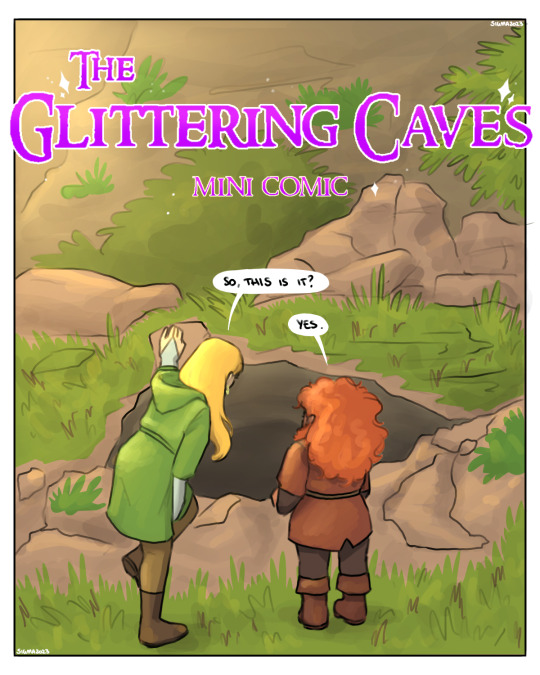
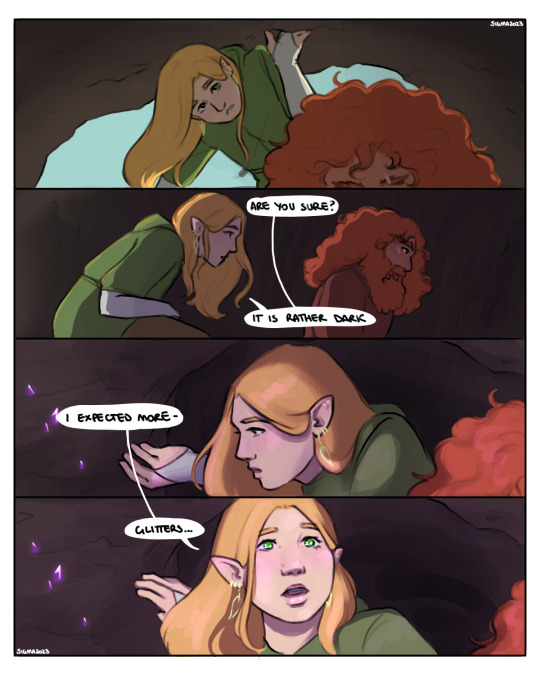
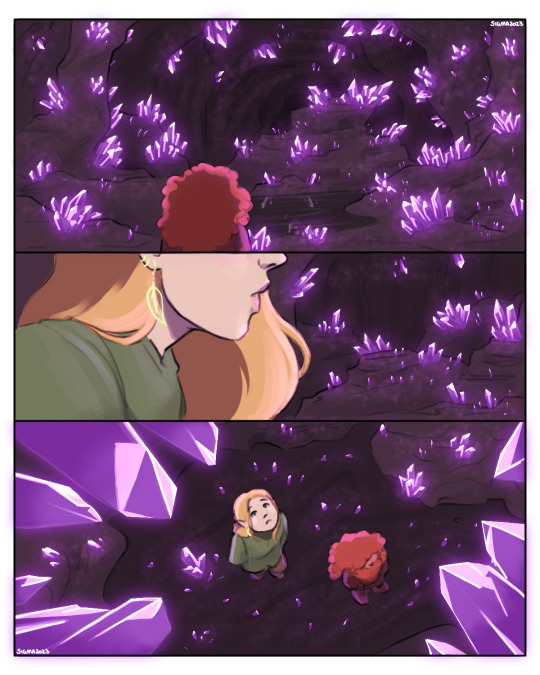
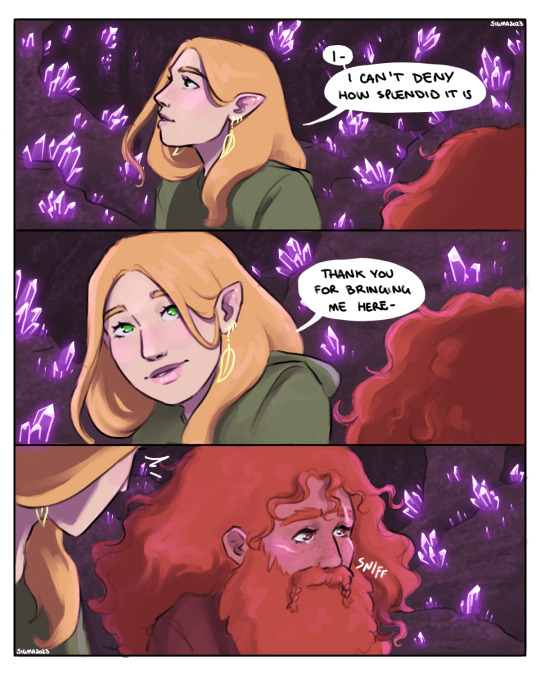
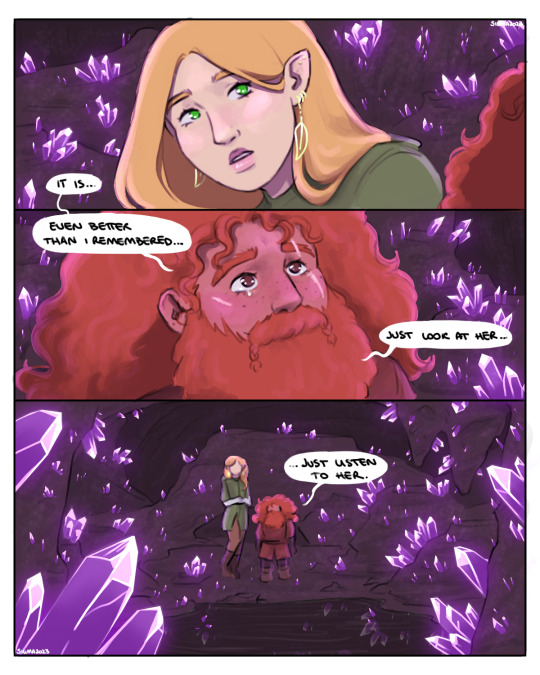
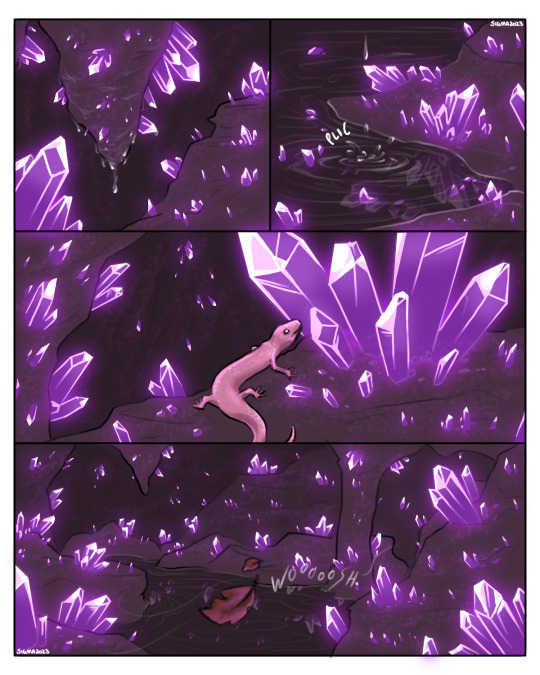
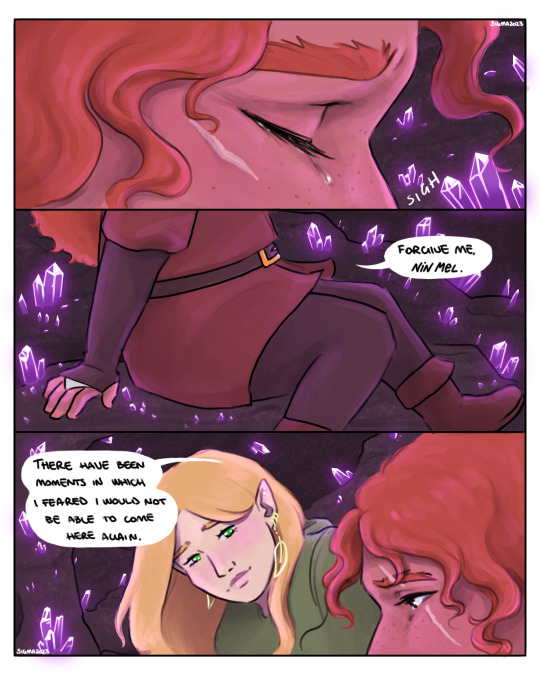
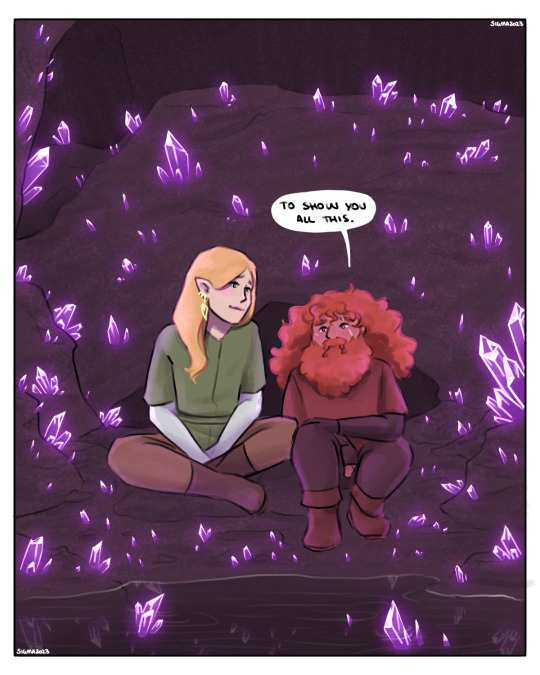


Gay people do love glitters
art • commissions
#lotr#gimli son of gloin#legolas#legolas x gimli#lord of the rings#lord of the rings fanart#lotr fanart#my art lotr#my comics#gimleaf#legolas greenleaf#glittering caves#lotr books#lotr books fanart#lotr book#lotr fancomic#fancomic#I think my love for nature is very obvious in this one#and it bit me in the ass because omg all those crystals#but it was worth it#god I love these two#gigolas#“nin mel” is wrong bc i didnt find a right source to translate sindarin so sorry for that#my art
4K notes
·
View notes
Text

I'm very happy to show you the 2nd art I made for @tolkienrsb! This one is called Descent. Gimli is showing Legolas the Glittering Caves of Aglarond for the first time. Trying to incomporate all of the colors in this piece was a challenge. Thank you @coveredinsun for keeping me inspired this whole time!! I already know her fic is gonnabe amazing, and you'll be able to read it here on 6th of September when the collection becomes open for everyone!
#gigolas#gimli/legolas#gimli#legolas#glittering caves#glittering caves of aglarond#my art#trsb24#trsb2024#trsb#tolkien reverse summer bang
192 notes
·
View notes
Text
Hey, so do you ever stop to think about how the premise of Lord of the Rings being an in-universe book written by some of the characters who lived through that story means that they decided what parts and perspectives to use to tell that story...?
And when our authors weren't there to experience the events themselves, they have to rely on what they're told about them by the characters who were there, right...?
Okay so stop and think about the Glittering Caves.
We never actually go to the caves in the narrative. Tolkien LOVES describing nature and natural beauty, but we don't actually see the caves described "by him" the way we do other places. Obviously Gimli's words are Tolkien's, yes; but we only see the caves filtered through his words about them, after the fact.
When Gimli and Éomer and the other Rohirrim take refuge there, the narrative doesn't follow them. Obviously from a narrative standpoint this is to keep the focus narrow, and not to interrupt the battle-sequence with a long ode to the beauty of the caves, and to create tension in the reader who doesn't know if these characters are okay or not. Which all makes sense!
But think about it in terms of the book that was written in Middle-earth by the folk living there. Why DON'T we get to have a direct experience of those caves? Gimli obviously related several other parts of the story that none of the Hobbits were there to witness to them, and which were written into the books as Direct Events Happening In The Narrative (think of the Paths of the Dead scene, for one of the more visceral moments!). So why not the Glittering Caves?
Was it because they wanted to keep that narrative focus and tension, and so they didn't include his perspective on that part of the battle? Perhaps, that's certainly a possibility to consider.
But also consider: when we do hear about the Glittering Caves, what we hear is Gimli telling Legolas about the Glittering Caves. THAT is the part of that event that is considered of importance to include in the book: not Gimli's actual experience when he was in them, but rather the part where he relates that experience TO Legolas.
And I kind of just THOUGHT about that today.
And went HUH.
#i mean that's pretty neat right?#the story could very easily have included gimli and eomer in the caves#and probably tolkien could have done some really beautiful stuff with language and tension and contrast#balancing the beauty of the caves with the fear and bloodshed of the battle outside#and it would probably be an incredibly lovely sequence tbh#then the gimli/legolas discussion about the caves could be easily glossed-over on the way to isengard#with the narrative just telling us that gimli told legolas about the caves and he was moved by gimli's words yadda yadda#since we would have already experienced the wonders he was talking about for ourselves and thus wouldn't need him to go on at length#and then they make their bargain to go to aglarond and fangorn together tra la lally resume normal service here#that would have also been a perfectly fine and lovely way to write that part of the story#BUT#that is not how the story was written#and i just find it really interesting and lovely that THAT is what was considered the important part about gimli's discovery of aglarond#lotr meta#gimli#legolas#aglarond#glittering caves#lord of the rings#lotr
390 notes
·
View notes
Text
the hour of dusk and dawn
His ending had been stolen away by an awe so profound he never would have thought to break it. Before him lay a scene radiant beyond overstatement; gleaming in the sunlight of ornate Dwarven lamps carefully spaced across the roof, it were as if dawn and dusk had broken at once, in a perfect symphony.
Gimli had spoken to him, yet the words fell on deaf ears. For Legolas had been gripped by the question: how could such a place exist?
Or: Legolas, the beginning moments of his marriage to Gimli, and a sight so beautiful it changes his life.
Word Count: 9.6k
Rating: Teen & Up Audiences
Archive Warning: None Apply
Relationships: Gimli/Legolas; Aragorn/Arwen (background); Éowyn & Legolas; Arwen Undómiel & Legolas; Legolas & Thranduil; Gimli & Aragorn; Aragorn & Legolas
Characters: Gimli (Son of Glóin); Legolas (Tolkien); Éowyn (Tolkien); Thranduil (Tolkien); Arwen Undómiel; Aragorn (Tolkien)
this is my fic for @tolkienrsb 2024, based off the wonderful artwork ‘descent’ made by the even lovelier @elvenlair! they were so inspiring and so gracious in their colaboration. see the work below or click the link to get to its post! <333

#I HOPE YALL LIKE IT#im quite proud of it#trsb24#tolkien#lord of the rings#lotr#legolas#legolas greenleaf#gimli#gimli son of gloin#aragorn#aragorn son of arathorn#arwen undomiel#thranduil#eowyn#lotr eowyn#eowyn of rohan#legolas x gimli#gimli x legolas#gimleaf#gigolas#gimleafposting#glittering caves#trsb2024#lotr fanfic#my writing#tolkien reverse summer bang
83 notes
·
View notes
Text
Legolas' Cave Trauma
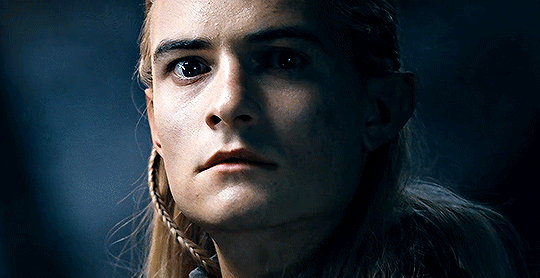
So it occurred to me that it seemed a bit weird that Legolas, who arguably has spent hundreds of years in a freaking cave palace, would be as anti-cave as he is in the books when Gimli goes off about the wonder of the Glittering Caves in Helm's Deep. So I had to reconcile these two facts. I consulted with the council of Elrond (aka my Tolkien friends) and one of them was like "just cause he lived in the caves doesn't mean he liked it. Thranduil had made the cave palace as a stronghold against the evils of the world outside his realm" while my thoughts was just "Legolas has cave trauma after Moria".
Because as we all know Legolas absolutely loses his shit when he sees the Balrog, like full on screaming Elvish meltdown.
So I combined the two theories to run along this line... Legolas was never a fan of caves, growing up on stories of the evil things that dwelt under the mountains he probably was not a huge fan when that's where his dad decided to repair to as the world grew more perilous. I picture little Leggy being especially scared of the Balrogs in stories told to him as a child. We gotta remember Balrogs are an extremely ancient and distant myth for even a lot of the elves, especially the "less wise" elves of Thranduil's folk. Most peoples are convinced that the last of the Balrogs perished in the War of Wrath, heck even people like Elrond may think this. So for Legolas this is his childhood monster under the bed, the Elvish Boogeyman. Balrogs shouldn't exist. They're just a scary story you tell kids to make them behave or to exemplify the valor of the elves of old who slew them. Some legends may say that some survived in deep places of the world but no one believes them any more, except maybe for little elven princelings but they grow up and grow out of it and after hundreds of years living in their dad's cave palace they're just an embarrassing memory of childhood fears.
But then Moria happens and it's his nightmares coming and standing before him more terrifying than he even imagined as a child and then striking down the most powerful being he's ever known. And it's just terrorizing and traumatizing and while the time in Lorien helps to settle his nerves he's none too eager to ever step foot underground again.
Especially to unknown caves.
Especially to a place underground that Gimli is a excited about.
The last time this happened he saw the terror of tales of long ago come to living reality in front of his eyes.
This may even be part of the reason why Legolas won't repeat the laments for Gandalf. "The grief is too near" and so is the terror. He doesn't wanna think about his living nightmare again, especially so soon. Of course he heals somewhat from his Cave Trauma and his friendship with Gimli helps I'm sure, after all they probably talked about it while they were hanging in Lorien becoming besties. And in turn seeing Legolas willingly go underground to take the Paths of the Dead encourages him to follow. He's just seen his bestie face his fears and now he must do the same.
#the glittering caves#spelunking#cave trauma#lord of the rings#tolkien#jrr tolkien#lotr#thranduil#legolas#legolas of the woodland realm#glittering caves#helms deep#legolas and gimli#lotr gimli#gimli son of gloin#gimli#balrog#balrog of morgoth#morgoth#moria#khazad dûm#bridge of khazad dum#i do not desire the speech of living men
122 notes
·
View notes
Text

A quick piece of Legolas and Gimli visiting the glittering caves / Aglarond :3
#lotr#legolas#gimli son of gloin#fan art#lotr art#glittering caves#everytime o draw leggy he looks a bit different#and I finally drew a whole gimli and not just doodles or a hand :D#also recycled the border from the hand piece oop
253 notes
·
View notes
Text
Just remembered that I dreamed of watching a special version of Lotr with my friends (I think in my dream someone called it the "Secret subscription Television version") and it was basically the same only that Gimli was book accurate and they included the Glittering caves of aglarond & other poet gimli scenes
I wish it was real
#it's a rubber#jolkien rolkien rolkien tolkien#lotr#lotr gimli#gimli#legolas#aglarond#glittering caves#the two towers#lotr movies#dream
17 notes
·
View notes
Text

NOT YET A DWARVEN KINGDOM FOUNDED BY GIMLI -- THE MOST POWERFUL DWARVEN KINGDOM OF THE FOURTH AGE.
PIC INFO: Resolution 1000x1217 -- Spotlight on a Tolkien Legendarium piece titled "Gimli & Legolas in the Glittering Caves of Aglarond,” from "The Two Towers" & "Return of the King," Appendix A," artwork by Ted Nasmith, c. 1992.
EXTRA INFO: First appeared in the 1992 (Centenary) Tolkien Calendar, published by Grafton Books. (It was the painting for March.) Also used on the cover of a new edition of "The Tolkien Companion" by J.E.A. Tyler.
"Immeasurable halls, filled with an everlasting music of water that tinkles into pools, as fair as Kheled-zâram in the starlight."
-- "The Two Towers," Book Three, Chapter VIII: "The Road to Isengard" by J.R.R. Tolkien
OVERVIEW: "The Glittering Caves of Aglarond where under the fotress of Helm’s deep in the white mountains. It is believed they where delved sometime in the Second Age by the Numenoreans, and in the War of the Ring it was used by the people of Rohan as a escape route from Sauruman the wizard’s army of Uruk-hai, Orcs, and the barbarian Dunlandings. After the war in the Fourth Age Gimli son of Gloin [dwarf member of the Fellowship of the Ring and survivor of the battle of Helm’s Deep] lead a group of dwarves of Erebor to Aglarond and became the Lord of the Glittering caves. Later on in the Fourth Age this became the most powerful dwarven kingdom in Middle-Earth."
-- LOCATIONS IN ARDA, PART 1 (Wordpress)
Source: https://middleearth3791.wordpress.com/2015/02/05/locations-in-arda-part-i & Facebook.
#The Glittering Caves#Glittering Caves#The Two Towers#Tolkien Legendarium#Legendarium#J.R.R. Tolkien#Fantasy#Ted Nasmith Art#Ted Nasmith Artist#The Lord of the Rings: The Two Towers#The Glittering Caves of Aglarond#The Third Age#Legolas and Gimli#Gimli and Legolas#Gimli#Legolas#Third Age#Fantasy Art#JRR Tolkien#Glittering Caves of Aglarond#Gouache#Gouache Style#Locations in Arda#The Lord of the Rings#Middle-earth#Ted Nasmith#Tolkien
23 notes
·
View notes
Text
#lotr#jrr tolkien#lotr books#lord of the rings#lotr poll#tolkien legendarium#lotr theories#gimli#lotr dwarves#lotr headcanons#gimli son of gloin#lotr gimli#erebor#glittering caves#lonely mountain#orcs#sauron#dain ironfoot#third age
12 notes
·
View notes
Text

Glittering caves
#aloy horizon#horizon photomode#horizon#video game photography#aloy#videogame landscape#video games#digital landscape#digital photography#horizon forbidden west#hfw#hfw aloy#aloy hfw#horizon aloy#aloy photomode#hfw photomode#glitter#caves#glittering caves#horizon burning shores#hfw burning shores#burning shores#horizon forbidden west aloy#forbidden west#aloy horizon forbidden west
8 notes
·
View notes
Text






#tundra#frozen#fairytale#dreamy#aesthetic#glitter#sparkle#pastel#pink#naturecore#ai#snow#cave#december#icy#landscape#scenery#nature#aes#holographic#iridescent#girly#pretty#gorgeous#wintercore#icicle#christmas#xmas#winter aesthetic#winter
3K notes
·
View notes
Text

The glittering caves✨ (wip)
Edit: the finished piece is out!! Here it is
art • commissions
#lotr#lord of the rings#glittering caves#gigolas#gimli son of gloin#legolas greenleaf#legolas#gimli#legolas x gimli#comic#wip#art wip#fancomic#lotr fanart#fanart#lord of the rings fanart#lotr fancomic#gimleaf#my art LOTR#my art
128 notes
·
View notes
Text
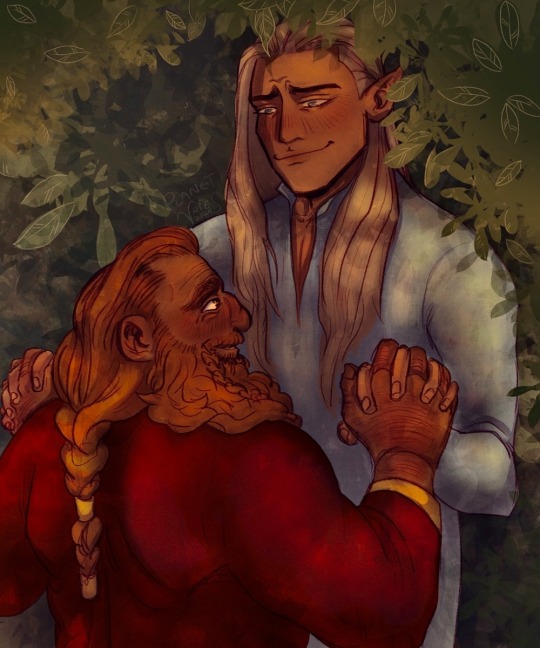
🪓🧡🏹
#gigolas#gimleaf#gimlas#legimli#lotr#lotr fanart#tolkien#fanart#illustration#planetvries art#my art#♈️ art#hey so yeah I love them#I love them being in love#I love them falling for each other#I love them touching each other and gazing longingly at each other#across the fire#I want them to look at each other and not know how they were ever without the other in their life#and unable to think about their life continuing without the other in it#how gimli is a sturdy tree at legolas’ side; deeply rooted#his laughter the sound of leaves being rustled in a breeze#and how legolas’ eyes glitter like mithril when touched by light#and his skin smooth as polished stone#and his voice the sound of all the gems within the glittering caves#and there is the fire of a forge within gimli that Legolas cannot help but be drawn to; gimli’s words like tempered steel.#so beautiful; the work of a craftsman; yet with the ability to cut if wielded flippantly. the mouth of a poet#silver-tongued#and Legolas; the cool breeze of fresh air when surfacing from a mine; a light within the darkness of a tunnel; a canary to follow to freedo#dwarrow do not mind the dark but they do not scoff at the flickering of candlelight nor do they overlook silver and sapphire and gold#yeah . . . so anyway totally feeling normal about them
75 notes
·
View notes
Note
Back at you with the asks! You write Gimli and Legolas as distinctively representative of their own peoples, and clearly you have some pretty strong headcanons about dwarves and elves, as kindreds. What counts as "smart" and "capable" for each, and how much would your Gimli and Legolas be considered smart and capable by their respective cultures? What might each of their peoples think of Gimli's and Legolas' particular strengths? What might their relative weaknesses be, in their own contexts? How much do you consciously or unconsciously write them to balance each other's weaknesses, within or across cultures?
Ohhhhh boy wow this is an extremely delightful and, frankly, flattering question and I feel like you are maybe giving me more credit for Thinking Things Through than I have actually earned or deserve, but I am going to try to answer it in full the way such a fantastic query deserves as best I can anyway!
(the not-so-secret secret is that I write a lot more by instinct/seat-of-my-pants than I probably should shhhhhh.)
Legolas and the Wood-elves: he's everybody's little brother. He's one of (if not the) youngest elves in Mirkwood, one of the very last to be born before the Shadow (which was already creeping over the forest when he was born, although only a little bit; not enough that they had to really acknowledge it yet, even if they had sort of noticed its first unwelcome tendrils) grew so dark that they stopped risking birthing new children into their woods.
So Mirkwood (Greenwood still, then; Greenwood for a long, long time before they finally resigned themselves to the truth of the name everyone else had given them a long time ago) has always, in my head, been a very we'll be happy to spite you on purpose sort of place. Their forest is awash in darkness, so they will be joyful as a weapon against the dark. They're happy on purpose. Their merriment is a weapon. And they raised their children to be happy, dammit. Not naive, not vulnerable; they couldn't afford that. They raised them to know the dangers of their forest, and to know how to protect themselves against it, yes; but also to do so without ever giving up on joy and laughter. Which was a weapon, yes, but it was also very important to them that their children would still grow-up happy. That no matter how dark Mirkwood got, the children would never stop laughing.
Which was great, and I think informs Legolas's attitude and consistent cheerfulness during the Quest very much (of course it does, since it's being worked backwards from the canonical fact of said attitude, as an explanation for it lol)...but also, as a sort of unintended side-effect, the elves of Mirkwood didn't really want to see their youngest generation grow up, not entirely. Elves clearly have to be able to adapt to seeing someone they knew as a baby as a whole-ass adult, because they live forever (unless you kill them) so there's no just aging-out and letting the new generation eventually take over; the new generation lives alongside all the old ones too. So they'd have to have become adept at this shift in perspective, culturally.
However. The last generation of children born in Greenwood before it became Mirkwood is a special case, because their youth was such a source of joy to everyone else that they just sort of...never entirely stopped thinking of them as kids. (The fact that there hasn't yet been a generation of kids to follow them contributes to this too, of course; they're seen as The Youngsters because they still are the youngest.)
So on one hand, yes everyone has learned to respect the skills and fighting prowess of "the youngsters" because this is Mirkwood, and you aren't going to have many elves who don't go out and fight because practically everything in the forest wants to kill you a little bit. And Mirkwood values things like swift reflexes and sharp eyes and good aim, because that's how you stay alive; they value being able to judge the difference between a shadow and A Shadow at a glance because if you guess wrong "dying" is sort of the best-case result. They value loyalty and determination and the ability to be joyful even in the face of defeat and despair. And Legolas has all of those traits and skills, for sure.
In fact I think Legolas is one of their best archers (in a scene I can't remember whether I've published yet or not, his sister muses on how it might be because his spirits are so bright that his vision is yet unclouded by the Shadow that hangs heavy on the rest of them) and he's definitely trusted to, like, Walk Into The Murderforest And Come Back Alive, sure. They trust him in a fight! He's a competent adult and a skilled archer! But he's also still a kid to their eyes, in a lot of ways, even though he isn't and they know he isn't...but he still feels like one.
So it's not like they're condescending or cruel or anything, but they do I think look at him and instinctively think "oh no baby, must take care of" on some level. So: is he seen as smart and capable? Yes, for sure. But also: "omg Elrond did you really send A CHILD to MORDOR?" Elrond: he's six-hundred years old wtf. Mirkwood: "yes, a six-hundred-year-old BABY!" Elrond: .....wtf tho. So, again, it's not like his opinions or suggestions would be dismissed or ignored...but there's always going to be a bit of a protective urge there (because the elves of Mirkwood worked so hard to protect their last generation of children, and it's a hard habit to break even though they aren't children anymore) and a kind of eternal-head-pat vibe.
Also he is sheltered. (Or was, before the Quest. I expect Elrond was smart enough to try and avoid Thranduil as much as possible before he got on that boat to Aman.) I go back and forth on whether or not Rílaerloth was involved in the Battle of Five Armies, but Legolas was absolutely not brought along when Thranduil marched a bunch of their forces off to potential-war-with-the-dwarves. It's one thing to let your kids go out and shoot spiders and possibly risk a glancing encounter with a Nazgûl ("and what do we do if we see one of the Lords of Dol Guldur? That's right we run the fuck away, thank you children") and another thing altogether to bring them purposefully to something that might become a war.
Especially for the elves of Mirkwood, who lost so much in the War of the Last Alliance. None of the folks who lived through that would be keen to bring any of the "youngsters" into a full-fledged war I don't think, even a comparatively little one that they were all expecting would end up being nothing more than some Posturing With Weapons in the end. (If Thranduil had known that it was going to be an actual war he wouldn't have brought Rílaerloth, either, even if he'd have had to have Eregmegil sit on her to stop her.)
*You'll note that I haven't mentioned anything about lore or wisdom or any of the more traditional Elvish Talents here, just fighting and survival; this is tied to the whole more dangerous, less wise aspect of Mirkwood. They certainly do value wisdom and lore still, and it's not like Legolas is ignorant or an idiot; but there's a reason he forgets the words to old songs halfway through, and Aragorn doesn't. In Mirkwood they're more focused on "this is how you kill a spider before it can eat you" and "how to recognize a web that's fresh enough to be sticky versus one that's old enough to be safe to touch" and "when you feel a creeping darkness like this brushing against your soul, run like fuck" than on the things you learn in Rivendell.
In the evenings they don't gather in their peaceful Hall of Fire and exchange poetry compositions, they get drunk and dance around the fire and sing as loud as they can to scare the shadows away. They're more practical in the sort of lore they value because they have to be. They don't have a magic Ring to protect their borders; in fact, they literally have Ringwraiths and Dark Lords squatting in their own damn forest far too much of the time. Also, honestly, a lot of that lore is the history of other people anyway.
The elves of Mirkwood stayed in their forest because they wanted to; the ones who fled from Doriath and joined them there came precisely because they wanted a "simpler and more natural" elvish way of life. They weren't really involved in a lot of the Elvish Drama going on outside their woods (and when the stakes got high enough that they did get involved, three-quarters of their army died so. yeah. that's not really going to inspire them to go out and socialize more, is it?) most of the time. So if maybe Legolas can't remember the difference between Andreth and Adanel...does it matter, in Mirkwood?
(No, no it doesn't.)
Gimli and the Dwarves: I have a lot fewer Concrete Headcanons and Societal World Building done for the Lonely Mountain than I do for Mirkwood, so this is going to be very much a briefer response, I'm afraid. But I think Gimli was likely equal parts respected and overlooked by his people, because he is a very talented and erudite dwarf of a very fine line of dwarves, so on one hand everybody definitely would respect him and his capabilities...but on the other, I think they do take him for granted a little bit, because of course he would be good at x and y and also z, because he is Gimli son of Glóin of the House of Durin! And he's certainly talented—but also hasn't really done anything of great significance before the Quest, due mainly to the fact that there simply wasn't anything significant to do. So: respected, yes. But not always acknowledged, in a way.
Not given the "he's a kid!" treatment like Legolas is, but just having his competence and skill taken for granted much more often than it gets remarked upon. People expect Gimli son of Glóin of the House of Durin to be awesome (and he is!). Mind you, over-achiever that he is, he goes out and gets himself sent on this massively important Quest and then proves to be so much more awesome than anyone was prepared for...but it's not until he gets back, and the full accounting of his deeds and accolades and honors is recounted, that anyone in the Lonely Mountain really stops to go oh huh.
And I think even then, they probably still continue to take his prowess for granted a little bit, simply because they're so used to him being that way—and so used to expecting him to excel at whatever it is he's asked to do. I think the full breadth of his brilliance probably won't be properly realized and appreciated until some years later, when he's Lord of Aglarond and there's a bit more distance there, and more younger dwarves who grew-up on the stories of Gimli more than just "yeah that's Glóin's kid, he's good hand at [insert-skill-here]" running around to be in proper awe of Gimli of the Nine Walkers, Gimli Lockbearer, Gimli Elf-Friend, Gimli Lord of the Glittering Caves, Gimli Silvertongue, Gimli Friend of Kings...etc etc etc.
I think the older dwarves might actually end up a little blindsided by it, in a way, when it does sort of click in their heads.
Weaknesses & Balance: Legolas has a tendency to run-off half-cocked without thinking things through, trusting his instinct and skill to get him out of whatever he might end up running into (part of this is because of the aforementioned sheltering: yes Mirkwood is a dangerous place, but he's never really been anywhere but Mirkwood before, and the dangers of Mirkwood are dangers that he knows how to deal with so he doesn't need to worry that he's going to end up in over-his-head there). He's also definitely the short-tempered one of the pair (hello, Éomer!) although he's also the more easy-going in a lot of ways simply because there aren't a lot of things that do make his temper spike.
Gimli by contrast is more of a craftsman in his approach to the world, although not so much as to hesitate when faced with a need to act (for instance: "dwarves can't shape stone with our fingernails, but I'll come figure it out anyway!") but that's countered somewhat by his extremely overpowering sense of loyalty: if his idiot friends run into a bad situation, you can bet that Gimli will be right on their heels even if he ought to know better. He's more self-effacing, too, which can be both a good thing and a bad thing, although in his case it's mostly the former. Conversely, he's very prideful, too, although he's such a gentleman about it that you don't really notice ("I would take offense at x, if you weren't too ignorant to know better!" etc) because it's not a rude sort of arrogance; just a supreme, contended confidence both in himself and in his people.
I think Gimli wears his heart on his sleeve a lot more, although Legolas is the one who's more directly open about his own thoughts and feelings whereas Gimli is more inclined to keep things to himself. (Gimli thinks; Legolas blurts.)
Gimli certainly does share his feelings ("what about your companions! what about Legolas and me!"), sometimes trying to cover them with gruffness (see: "I was upset to think you might be dead when I found you underneath that troll, only because I'd gone to so much effort to keep you alive, you see! I definitely wasn't running around the battlefield frantically searching for you out of pure friendship and love, nope!" and "say not so! I'd be bummed if all the elves left because elves are kind of cool you know?") and sometimes dropping some full-on poetry at us (see: "I have looked the last upon that which is fairest!" as well as literally every single word about Aglarond lol) but it tends to pop out in half-involuntary bursts where he just gets so overwhelmed by how much he cares that he can't help himself.
Whereas Legolas is just like "oh yeah let me tell you about the Sea-Longing that's eating my soul from the inside out, nbd" or "sorry, can't translate these songs for you because I Am Sad." He may not walk around actively volunteering his thoughts or opinions unprompted often, but he doesn't seem to make any efforts to maintain a pretense or keep whatever he's feeling private either, when the topic comes up. He'll just walk around Singing What He Feels for the whole world to hear, why not?
And on the aforementioned topics of poetic phrasing and Not Having A Filter, Legolas is definitely The Awkward One when it comes to conversation and diplomacy. Gimli Silvertongue knows how to craft a clever phrase, thank you very much! He is eloquent and gracious and even-tempered and Legolas...well, we're all probably lucky if he's remembered to speak in Westron rather than his own weird forest dialect of Sindarin, tbh. When one of them needs to do the talking for them both, it's almost always going to be Gimli. Legolas is the guy you get when you need to shoot-down a flying Nazgûl; Gimli is the one you call when there's a delicate diplomatic situation to be discussed.
Legolas is also definitely the more easily distracted, and I think Gimli teases him about that a lot—although that's also a bit of a cover, because Gimli knows that Legolas's senses are so much sharper than his. Said distractability is in part a result of the natural flightiness of Wood-elves and in part the result of having those keen senses: he notices more things, so of course he's more likely to be distracted by them. Having said sharp senses also means Legolas can more safely afford to allow himself to be distracted, because he doesn't have to actually pay attention to notice an approaching danger the way Gimli does. (And yes, Gimli gets grumpy about that sometimes, but this is part of that "cover feelings through gruffness" thing: he doesn't want to admit that he worries that Legolas will get himself into trouble by not paying enough attention, and he definitely doesn't want to admit that dwarven senses can't keep up.)
In fact, I think post-Quest one of Gimli's biggest weaknesses is his concern that a mortal dwarf can't keep up with an elf. I think he worries about it a lot more than is merited by reality, actually, and I think that's informed in large part by his knowledge of his own mortality and how much it will eventually hurt Legolas to lose him. He cannot help but dwell on all the things a dwarf can't do that an elf can, because he's so preoccupied by the one big one: an elf can stay, while a dwarf eventually has* to leave...has to die. So while it doesn't exactly shake his sense of confidence in himself, it has him paying a lot more attention to what he can't do than what he can. He doesn't forget his strength or skills; he just ends up weighing them less than they deserve when balanced against what elves can do instead.
*he doesn't, as it turns out! but he doesn't know that yet.
(As much as he comes to dread Gimli's death, none of the rest of that has ever occurred to Legolas. If anyone asked Legolas if he ever got "tired" of being "held-back" by the "limitations of a dwarf" you'd get a very confused look in return and an apologetic explanation about how Different Types Of People Have Different Strengths, Silly...or, depending on how rudely you phrased the question, a very quick and probably painful lesson on what more dangerous and less wise can mean. Legolas doesn't really understand mortal limits—see: "are you sure you don't want to just keep running all night? why not?" and of course the infamous "gee why don't y'all just walk ON the snow? what, like it's hard?" incident—but when somebody says "No Legolas, that's Not Physically Possible" he rolls with it, even being able to later point-out to marchwardens who don't know Mortal Limits as well as he (now) does that his friends need more than a single rope to run on, pls!)
Legolas is right, though, because their different strengths really do balance one another well: Gimli is the solid, thoughtful, reliable rock who makes for both an unwavering foundation on which to build and an eloquent shield upon which the waves of the world will break and leave them both unscathed behind his kind and dauntless walls. Legolas is the swift, sharp knifeblade that darts out mercilessly from the shadows to dispatch a threat and then turns around and returns just as fleetly with armfuls of unquenched joy and laughter to brighten even the blackest, deepest night without any caution or hesitation. Legolas reminds Gimli of how much he delights in curiosity and exploration; Gimli reminds Legolas of the joy and comfort of coming home after wandering afar.
Of course they had to go to Aman together. Gimli could never have resisted following Legolas somewhere so interesting, and Legolas would never have managed such a portentous journey without Gimli there to steady him along the path.
#this was really awesome to ramble my way through thank you so much!#i definitely talked too much and thought too much and had a GREAT time doing it#sorry it took me so long; it's because i had too much fun with it whoops#lotr meta#legolas#gimli#mirkwood#greenwood#lonely mountain#erebor#aglarond#glittering caves#lotr#lotr canon#lotr headcanons#elves#dwarves#rilaerloth#thranduil#gloin#gimleaf
118 notes
·
View notes
Text
The contrast between how Gimli and Legolas approach things that fascinate them is so interesting; Gimli tends to focus on what he finds beautiful and describes it with paragraph of flowery descriptions (he acted in a similar manner both upon seeing Galadriel and upon seeing the Glittering Caves); meanwhile Legolas is more interested in the strange, and instead of using words to convey his feelings he'd rather explore


#When Gimli described Glittering Caves to him Legolas also said he wishes to go and see them#They're a good match they find each other endlessly interesting
233 notes
·
View notes
Text

If this is supposed to be scary you've failed. Bc this looks dope as fuck
#i already decided#co. and mc will frolic around in a glittering gem cave#minus the giant skull#idk why but i immediately thought of shadow!Nia nakéé#too much information?#too bad#why are you even reading this#like come on#what did you expect#honestly#ok stop reading#no#seriously#stop#blades of light and shadow#choices#pixelberry#choices stories you play#playchoices#blades of light and shadow 3
52 notes
·
View notes